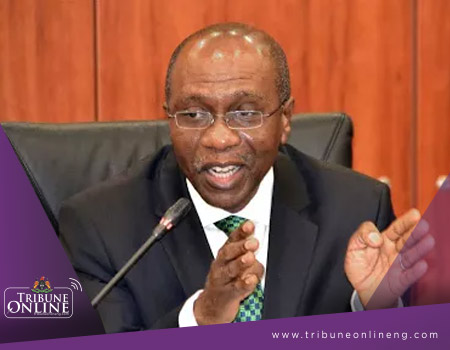The Central Bank of Nigeria (CBN) has suspended indefinitely the withdrawal and deposit processing fees it recently introduced under its cashless policy.
A circular issued on Friday and signed by Dipo Fatokun, Director, Banking and Payment Systems department of the CBN directed all bank’s that had started implementing the processing which came into effect on April 1 this year should be refunded to customers.
The circular stated that the “ the position of the policy shall now revert to the status quo ante, that is the existing policy prior to the announcement of the new policy as earlier implemented in Lagos, Ogun, Kano, Anambra Rivers states and the FCT shall remain in force.”
The old charges to be reverted to are: individual withdrawal/lodgment limits of N500,000 will now attract processing fee of 3% and zero for lodgment. Also corporate withdrawals/ lodgment limits of N3,000,000 will now attract 5% processing fee for withdrawals and zero fees for lodgments.
The CBN had issued two circulars in February and March this year directing banks to implement a new regime of processing fees on withdrawals and lodgments by depositors.
The old circular titled, “Circular on nationwide implementation of the cashless policy,” read:
“Charges for cash deposit by individuals are as follows: Less than N500,000, zero charge; from N500,000 to N1 million, 1.5 per cent; from N1 million to N5 million, two per cent charge; above N5 million, 3 per cent charge.”
“Charges for cash withdrawal by individuals are as follows: Less than N500,000, zero charge; From N500,000 to N1 million, two per cent; from N1 million to N5 million, 3 per cent charge; above N5 million, 7.5 per cent charge.”
“Charges for corporate cash deposit are as follow: Less than N3 million, zero charge; from N3 million to N10 million, two per cent; from N10 million to N40 million, three per cent; above N40 million, five per cent.”
“Charges for corporate cash withdrawal are as follows: Less than N3 million, zero charge; from N3 million to N10 million, five per cent; from N10 million to N40 million, 7.5 per cent; above N40 million, 10 per cent.”
“The new charges would take effect from April 1 2017, in the existing cashless states (Lagos, Ogun, Kano, Abia, Anambra, Rivers and the FCT).”
“The policy shall be implemented with the charges taking effect on May 1, 2017 in the following states: Bauchi, Bayelsa, Delta, Enugu, Gombe, Imo, Kaduna, Ondo, Osun and Plateau.”
“The policy shall be implemented with the charges taking effect on August 1, 2017 in the following states: Edo, Katsina, Jigawa, Niger, Oyo, Adamawa, Akwa Ibom, Ebonyi, Taraba and Nasarawa.”
“The policy shall be implemented with the charges taking effect on October 1, 2017 in the following states: Borno, Benue, Ekiti, Cross River, Kebbi, Kogi, Kwara, Yobe, Sokoto and Zamfara.”
“The income generated from the processing fees charged above the allowable cash transaction limits shall be shared between the CBN and the banks in the ratio of 40:60.”
This initial policy had generated a lot of outcry from depositors who felt they were being overcharged for making legitimate deposits and that such charges put the cashless policy at odds with its intended desire to encourage financial inclusion by attracting previously unbanked individuals and corporates.
WATCH TOP VIDEOS FROM NIGERIAN TRIBUNE TV
- Let’s Talk About SELF-AWARENESS
- Is Your Confidence Mistaken for Pride? Let’s talk about it
- Is Etiquette About Perfection…Or Just Not Being Rude?
- Top Psychologist Reveal 3 Signs You’re Struggling With Imposter Syndrome
- Do You Pick Up Work-Related Calls at Midnight or Never? Let’s Talk About Boundaries






